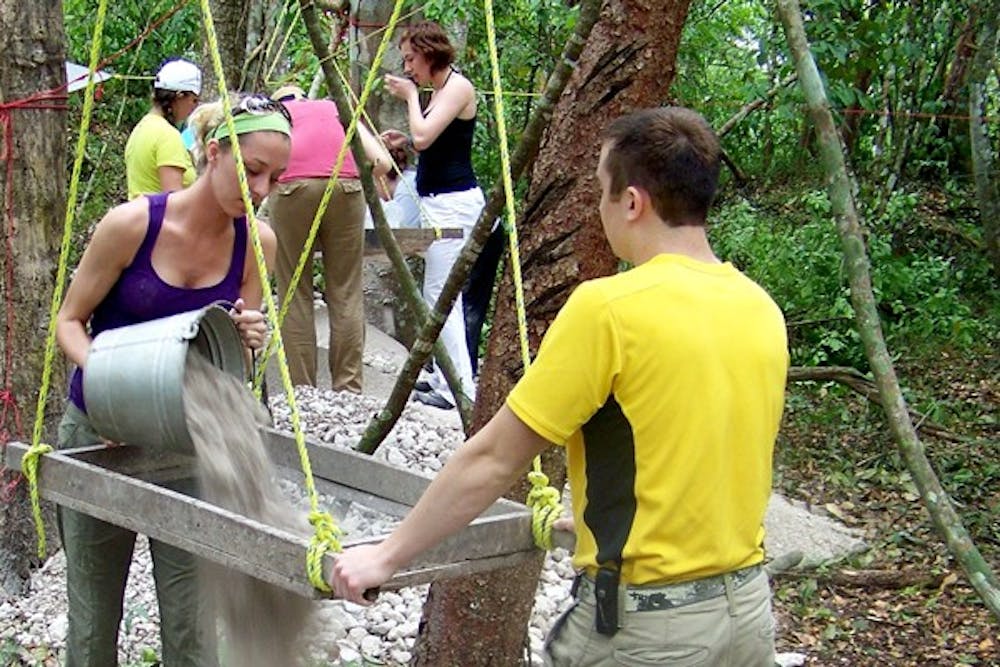New faculty-led study abroad program offers students new opportunities

A new type of study abroad program is coming to Central Michigan University in the spring of 2013, where students will travel to and stay in Belize with faculty members for an entire semester.
The first of its kind at CMU, the program, "Sustainability and Globalization in Belize," allows students to learn about the local culture and meet and work with local Belizeans, as well as go on excavations through the country and traveling to different cities.
“This is the first semester-long study abroad program organized and led by CMU faculty members,” said Cameron Griffith, anthropology professor and co-founder of the program.
He said the deadline to apply for the Spring 2013 semester-long trip is Friday.
The program involves students and faculty taking part in the trip, whereas other study abroad trips may be through third-party organizations independent of CMU, he said.
Griffith said being taught by a faculty member in a foreign country will help students not only learn more, but to also be more comfortable with their surroundings.
“You go down and you are taught by a professor you already know or could take classes from again here in Mount Pleasant,” he said.
The new program comes at a time where University President George Ross and the Office of Study Abroad are making it a goal to expand CMU's study abroad program and make the campus a global one, Griffith said.
“President Ross said CMU is very dedicated to international opportunities and study abroad programs,” Griffith said. “More and more, people are realizing that in some cases, a study abroad program can provide a learning experience that is unique and can't get anywhere else.”
He said past trips to Belize were shorter, two-week trips and said those specific trips during the summer months will continue along with the new, semester-long trips.
Students on the trip will do many things, including excavating the Actun Tunichil Muknal, Caracol and Lamanai archaeological sites, scattered all throughout the country.
He said the program, which can be taken as credit for ANT 388, 389 and 500, or an independent study credit, benefits the students directly.
“When any program is led by faculty, it means the credits are directly coming from CMU,” he said. “The faculty members have developed it through the curricular process.”
Petoskey senior Kathryn Slocum went on a trip to Belize in May with Griffith as part of a study abroad program.
“We traveled all over,” she said. “There were more hands-on experiences. There were lectures at night.”
Slocum did many archaeological digs and discovered years of history and culture in the landscape there.
“During the day, we did an archaeological dig where we sifted through material,” she said. “It was really cool to touch pottery from so long ago.”
Slocum said Griffith's connections to many people in Belize made the trip unique.
“Professor Griffith is well-known there,” she said. “He has so many connections so we could make plans.”
Being there was better than reading about Belize in a book, Slocum said.
“When you study abroad you learn, meet and experience new cultures,” she said.
Allen Park senior Elizabeth Bonora said her experience going to Belize was unforgettable.
“We visited various parts of the country; however my top three favorites would have to be Actun Tunichil Muknal, Xunantunich and Cahal Pech,” she said. “The cave system was great, trekking through the jungle, swimming into the entrance of a cave, and climbing around in there for four hours was breathtaking.”
She said she would like to go back in the spring for the whole semester.
“There is so much more that Belize has to offer that one cannot get just out of 10 days,” she said. “Everything about Belize draws you in; the people, the environment, the food, the history.”
She said the new, faculty-led program will bring out new opportunities for students to go on other study abroad trips and potentially more faculty-led trips.
“There are always going to be different study abroad programs," she said. " But by adding on faculty-led study abroad trips, it opens the door to a new audience of students that may have never thought about study abroad before.”



